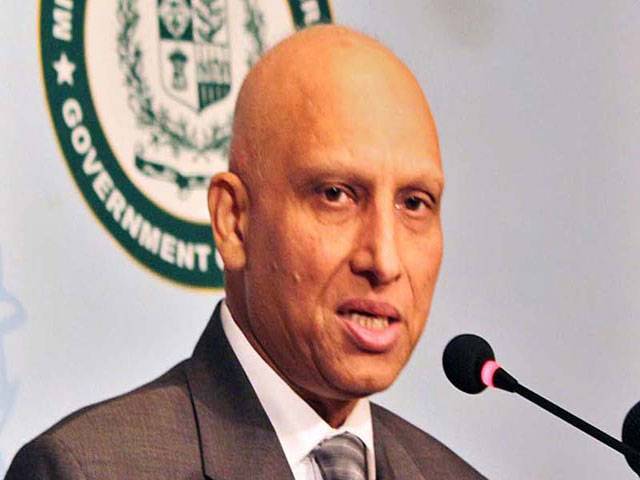NEW YORK - Foreign Secretary Aizaz Ahmad Chaudhry has said the whole nation is united on the Kashmir issue and Indian discontent doesn’t bother them.
Talking to media persons after the address of Prime Minister Nawaz Sharif to the General Assembly in New York, the foreign secretary said the PM strongly represented Pakistan’s stance in the General Assembly. He added Pakistan would continue its political struggle over the Kashmir issue. He made it clear that Pakistan wanted relations with India on the basis of equity.
Referring to the PM”s meeting with Joe Biden, Aizaz said both the leaders discussed nuclear stability and energy crisis in a pleasant environment.
The foreign secretary also maintained the country initiated the Zarb-e-Azb operation on its own and not at anybody’s behest.
Commenting on the meeting between PM Sharif and US Vice President Joseph Biden, Chaudhry said the two leaders had the meeting amidst a pleasant ambience and discussed different issues, including nuclear stability and energy crisis. Pakistan would continue its efforts for global peace, he added.
Meanwhile, addressing an informal ministerial meeting, commemorating the international day for the total elimination of nuclear weapons on September 26 on the sidelines of the 69th session of the UN General Assembly, the foreign secretary stated that Pakistan supports the global consensus reached on the disarmament agenda during the first special session at the UN General Assembly on disarmament in 1978, which called for general and complete disarmament under effective international control.
He added Pakistan remains fully committed to the goal of universal, non-discriminatory and verifiable nuclear disarmament. He also stated Pakistan calls for commencement of negotiations in the conference on disarmament without delay on a comprehensive nuclear weapons convention that prohibits the possession, development, production, acquisition, testing, stockpiling, transfer, use or threat of use of nuclear weapons and provides for their destruction.
AZIZ REITERATES PAK COMMITMENT TO KASHMIR DISPUTE: Adviser to Prime Minister on National Security and Foreign Affairs Sartaj Aziz Friday reiterated Pakistan’s commitment to finding a just and peaceful solution to the Kashmir problem in accordance with relevant UN Security Council resolutions and aspirations of Kashmiri people.
Addressing the annual coordination meeting of the OIC foreign ministers on the sidelines of the UN General Assembly sessions, the advisor thanked the OIC for its consistent support to the people of Jammu and Kashmir in their legitimate struggle for realisation of self-determination which was promised to them by the international community and top Indian leadership.
The adviser apprised his OIC counterparts of the continuing gross and systematic human rights violations and persecution in Indian Occupied Kashmir. He regretted India’s decision to call off foreign secretary level talks, but hoped it would soon understand the importance of meaningful dialogue for durable peace in the interest of one and a half billion people of South Asia.
The adviser reiterated Pakistan’s unequivocal condemnation of Israeli aggression and carnage in occupied Gaza. Noting that the situation in Palestine was still untenable despite ceasefire, he asserted establishment of an independent and viable Palestine state on the basis of pre-1967 border could only guarantee lasting peace in the region.
Aziz also voiced Pakistan’s serious concerns over the destructive conflict in Syria and Iraq and called on the OIC member states to resolve their differences through dialogue in the spirit of Islamic solidarity and fraternity.
The meeting was chaired by Saudi Foreign Minister Prince Saud Al-Faisal and attended by the foreign ministers of member states, the OIC secretary general and deputy secretary general of United Nations. The participating foreign ministers delivered policy statements on the important issues faced by the Muslim world and stressed the need for greater harmony and unity of purposes to overcome these challenges.
Thursday, April 18, 2024
Indian discontent doesn’t bother Pakistan: Aizaz

PPP, PML-N parliamentary delegation in Beijing to boost ties
April 18, 2024
Eight more Sindh ministers sworn in
April 18, 2024
AGP’s audit report discloses irregularities in BRT project
April 18, 2024
National Assembly session tomorrow
April 18, 2024
EC announces election schedule for PP-269
April 18, 2024
Hepatitis Challenge
April 18, 2024
IMF Predictions
April 18, 2024
Wheat War
April 18, 2024
Rail Revival
April 17, 2024
Addressing Climate Change
April 17, 2024
Justice denied
April 18, 2024
AI dilemmas unveiled
April 18, 2024
Tax tangle
April 18, 2024
Workforce inequality
April 17, 2024
New partnerships
April 17, 2024
ePaper - Nawaiwaqt
Advertisement
Nawaiwaqt Group | Copyright © 2024





